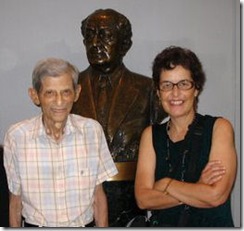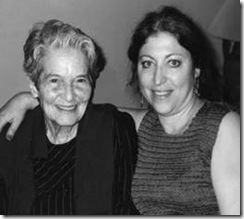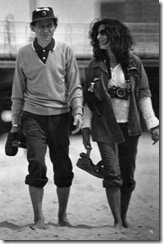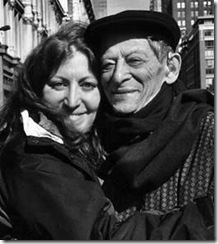Ira: do a documentary on me at your own peril July 23, 2008
Posted by admin in : Ira, Testimonials , comments closedPam Sporn
Bronx, NY
I first heard the name Ira Gollobin in 1964 when my father was called before HUAC [House Un-American Activities Committee] in Buffalo. Ira was his lawyer. The hearings were dramatic as my father and the other witnesses followed Ira’s counsel to skillfully and relentlessly challenge the legitimacy of the committee. Ira helped turn what could have been a traumatic event in the life of an 8 year old into a moment of extreme pride and a life long lesson in speaking truth to power. A year ago I asked Ira if I could do a documentary film on his life and work. He said I could do so at my own peril and that I’d have to accept the consequences. I agreed. I’d like to leave you with two clips of Ira.
Two Ruth Gollobins! July 19, 2008
Posted by admin in : Ira, Ruth, Testimonials , comments closedRuth Gollobin-Basta
Cedarhurst, NY
For me, the beginning of knowing Ruth was 1983. Ruth Baharis was dating my Dad, Ira, who had lost his wife, my mother, in February of 1981. He was 72 years young and was happy again. Parents want their children to be happy; well, this child was happy for her parent! In 1985, Ruth was there to celebrate my marriage to my husband Peter Basta and was ecstatic with the birth of her first grandchildren in 1988 and 1989. When my father married Ruth in June of
1994, the world now had two Ruth Gollobins! We shared the same name, even our Yiddish name. We were both stepmothers and grandmothers, and we both loved the same man very much, albeit differently! We were both raised in families that were socially active, and we both shared compassion for people, be they family, friend, or stranger. Not bad at all!
Ruth was a wonderful grandmother to my children, Matthew and Caitlin; always insisting on taking the Long Island Railroad to Cedarhurst to celebrate their birthdays, school plays, and activities. Though my father and Ruth shared the same vision of a different society, it was quite amazing that he had married a woman who owned her own tool box and who loved to go to Yankee and Mets baseball games with us!
Ruth was quirky, Ruth was funny, Ruth was bright, and Ruth was usually late. The two of us would often sneak away to share a cup of coffee together without my Dad’s disapproving looks. Ruth was especially thoughtful of finding that special present for not only her grandchildren but my grandchildren as well. Central Park was my neighborhood park as a child; it was her special place to jog around the reservoir, to photograph children and the trees, especially her Osage tree, or to just wander and sit and love.
Around the end of 2007, because of Alzheimer’s, the threads became tangled more and more in her brain, however, Ruth’s intelligent mind was still functioning. We became closer and although quite ill, she gave me an extraordinary present — the gift of forgiveness.
Organizing this memorial gave me further insight and respect for her. Someone once wrote, “The ultimate test of a moral society is the kind of world it leaves to its children.” Although Ruth never had children of her own, she lived her entire life trying to make this world a better place.
My Daddy
I am only 58, not like my father who would have been 97 on July 18th and whose speech about his wife Ruth remains as words on an index card (vitamins, Poland, Hunter College, cats, babies, photography, the Left, etc.) because he was such a gifted speaker. It was 2005, and about three days before he was being honored as a founding member of the National Lawyers Guild for his unwavering fight to defend the rights of immigrants, when he called me up and said, “You know dear, people are paying good money to hear me speak, they are not paying to see me read.” So I’m hoping that when I’m in my nineties I can be a grown-up like him.
My Dad was a courageous attorney who led the vanguard defending the rights of immigrants for 70 years. He was part of the struggle to transform us into a truly more human planet. In November 1967, the columnist James A. Wechsler entitled his column “Happy Endings” writing about deportation facing Joseph Sherman to his native Poland after 46 years of residence in the U.S. and of 65 year old Wilhelm Lahtinen to Finland who had arrived here as an infant. Wechsler wrote: “In any comment on the two happy endings recorded in swift succession after so many years of anxiety, there should be recognition somewhere for attorney Gollobin. A quiet, modest man, he will never capture fame or fortune in the fashion of Lee Bailey or Edward Bennett Williams, but his resolute dedication sustained lonely clients through many long years. Such lawyers are too rare and their hours of glory too few. They endure long winters of anonymous frustration. But this spring Gollobin’s winning record in the justice league must offer large compensation for years of deadlock and defeat. He gains no such tangible dividends as those enjoyed by barristers who succeed in helping the affluent evade the tax laws. His reward is the sight of a new light in the eyes of Joseph Sherman and Wilhelm Lahtinen, and, one hopes, his ensuing capacity to sleep serenely at night.”
I found my father’s 1928 Evander Childs High School yearbook. Under his name he tells us that he was the manager of the tennis club, vice-president of the French club, member of the yearbook, track team, and service league. He wrote across his photo, “I’ll be growing up before long.” The yearbook editor wrote, “The tiny manager of successful racquets.” And on the page for autographs a fellow classmate wrote the following: “Small in stature, long in deed, my friend Ira will never be greedy.” My grandmother Nana Clara would tell me that when Ira was about three she found him sitting facing a corner, saying aloud, “Ira was a very bad boy.” No one ever found out what he did, but throughout his amazing life he never stopped fighting the bad boys and their terrible deeds!
My father had a most remarkable mind. As a child and as an adult, I’d ask what I thought was a simple question wanting a simple answer…. well not from him! He’d go back what sounded like 10,000 years in history, and what I thought would be a one- or two-minute answer became a 30-minute explanation and history lesson.
To this day I find it strange to go to someone’s home and never see a book. In my Dad’s apartment every room and hall had a floor-to-ceiling bookcase with books double-stacked. As a child I read Charles Dickens, Nancy Drew, Willa Cather, and Mark Twain.
And to supplement and expand our world my parents had a shelf on which they would rotate books for my sister and me to read: ones about Resistance fighters of World War II, W.E.B. DuBois, Langston Hughes, Russian folktales, Sholem Aleichem. To look at his comprehensive over 2,000-volume library now and know that he read and understood EVERY book — Piaget, Shakespeare, Walt Whitman, Marx, Sophocles, and Lincoln, to name a few — still amazes me. But even more remarkable is that in the course of a conversation he would begin to quote, not just a line but sometimes paragraphs, of poetry or prose, verbatim, even if it was in Latin, French or German, telling me the translation and then going back to our original discussion; never going off on tangents, focused throughout!
And speaking of books, ah, THE BOOK, Dialectical Materialism. Over decades I typed and typed and retyped that 600-page book so many times that one day I called him up and said, “Dad, guess what? I’m starting to understand it!” Although he didn’t own a computer and many including his grandchildren, Matt and Caitlin, would try, he knew to ask me to “Google” or buy a book on-line to help in his research for his next, albeit unfinished, mini opus, entitled “Seeds and Society.” I typed a letter that he wrote to a friend in August, 2007, quoting the anthropologist James Frazier, “My sun is westering and the lengthening shadows remind me to work while it still is day.”
My sister and I grew up in a very political and progressive home, filled with activism. Our parents put us in a carriage for a walk, but in 1953 it was for a demonstration to save Ethel and Julius Rosenberg. Yet we went to shuleh to learn Yiddish, went to sleep-away camp, took modern dance at Henry Street Settlement, spent summers in a bungalow at the beach in Far Rockaway with our Bubba and our Nana, and went ice skating and rode the carousel in Central Park. Our parents took us to Broadway plays — plays like The Wall, The Crucible, The Miracle Worker, or A Raisin in the Sun — but not having much money they would buy two tickets for one play and two for another. I would go with our father and my sister would go with our mother, or vice versa; in this way we all would “see” two plays each, albeit vicariously! In 1963 we all went to the March on Washington for integration and to hear Martin Luther King. There were Pete Seeger concerts or the Bolshoi Ballet at Carnegie Hall and then we were off to enjoy some blueberry pie at the Horn & Hardart. My Dad had a thing for blueberries since a child, so whether it was with his brother on a bike trip, up in Roscoe when I was a kid or with his grandchildren Matt and Caitlin, he just grabbed handfuls of the fruit and ate them!
Like all children, my sister and I were taught right from wrong but we also were taught Left from Right! We quickly mastered the dialectics of picketing, stuffing envelopes, and speaking our minds. We didn’t have a father who played cards and talked sports with the guys. We had a father who played checkers with us, taught us how to fold the Times when we were eight, and made sure we knew about Sacco and Vanzetti. We grew up in a home where we were taught to see what is inside a person, not outside — “appearance and essence,” he would say. In those days it was quite unique to have a father make our school lunch sandwiches, help with the dishes, and bring his own suits to the cleaners. My mother Esther was working part-time, active in the PTA, and organizing others in the neighborhood to fight for better schools, hospitals, and a better society. As a teenager my friends thought my parents were pretty cool because they would be on the same antiwar demonstrations with us. My high school teacher and principal weren’t prepared when I refused to participate in an air-raid shelter drill. (For those that may not remember, in elementary school we hid under the desk, in junior high school we went to the basement, and by the time I entered the Bronx High School of Science we just waited in the hall.) I was suspended for only a day because my father threatened to sue if I wasn’t reinstated. My parents told me how proud they were.
For two decades my father was defending many called before HUAC in addition to his other cases. In those days some of his Chinese clients would take our family out for a dinner as a thank-you. I have heard that many paid their filing fees and basically that was his payment! Although my parents were always busy and we had to share my Mom and Dad with what felt like everybody, I knew they loved us deeply and I always really felt it.
Speaking of payment, my Dad would sometimes tell some potential clients that he couldn’t help them. They would say, “But another lawyer said that if I gave them $6,000 they would try to help me.” My Dad would get out his garbage can and say, “Would you put your money in the garbage? I know the law and for your situation there is nothing I can do.” Sometimes a potential client’s case didn’t warrant hiring a lawyer. If you were from Cuba, he would tell you “how to do it yourself” and charge an extremely low consultation fee. And the best is that even after he retired he would be notified by the Immigration Service that so-and-so had been given a green card, etc. because he was still listed as the attorney on record. He was a people’s lawyer, always living his life true to his beliefs in helping people and making a better world for immigrants and their families.
When my father “retired from the practice of law” in 2004, he told me that he was doing so before he “got too decrepit” and, after all, “the landlord was taking all his money!” Asking that his clients retrieve their files, he ended his letter to them by stating, “It was a privilege to be your lawyer and I have done my best in preparing and presenting your case.”
My father was ageless. Rain or shine, for the past two years our Saturdays would have a routine: the two of us would stop at a health food store, a vitamin store, walk and shop our way through the Farmer’s Market at Union Square (of course hugging the ladies at the fish stand), sometimes getting a bite to eat, and then I would drop him off at the gym! How many daughters can give their 96-year-old father a yoga mat and flannel-lined blue jeans for Chanukah? (Yes I found his size! He thought the person who invented them was brilliant!) My Dad dropped the “in-law” in his loving and special relationship with my husband Peter soon after they met, and he so enjoyed the homemade chocolate nut bark Peter supplied. I don’t have to tell anyone how he loved and enjoyed his grandchildren, and in case anyone is wondering, yes, he discussed dialectical materialism with Matt and Caitlin!
In a Father’s Day card I wrote: “In case you’ve forgotten, you’ve already given me so much: a wonderful, amazing, special, and loving father (even if he forgets to change his underwear and doesn’t know ‘who’s on first base’); an unusual but meaningful last name (so what if I’m spending my life spelling and pronouncing it); the family patent to a unique, lightweight, portable appointment book (forget Palm Pilot, or a Filofax and Mont Blanc pens; just give him seven 3×5 cards, a stapler, and an extremely small pencil to fit in his back pocket and voila! He had his calendar for the week); the family Bible: Dialectical Materialism; a wonderful sense of humor that I sometimes love even though I’m slow with the pun-ches; and a sense of giving, sharing, and loving that’s unselfish and endless and special.”
My loving, special, extraordinary father had many amazing abilities, but I cannot think of anything more wonderful and special than his being a father, my father, the father all children deserve!
Lawyer’s Hero, Ladies’ Man July 19, 2008
Posted by admin in : Ira, Testimonials , comments closedJanet Higbie, Chelsea, NY
I came to know Ira and Ruth fairly recently, when I was in my last year at New York Law School, and he was a young man of 93. I was researching Kong Hai Chew v. Colding, one of Ira’s greatest cases, and I was fascinated to listen as he talked for hours about his life and work. One line in particular has stayed with me from those talks.
 Ira, like others in the American Committee for the Protection of the Foreign Born and the Lawyers Guild, represented clients called before the House Un-American Activities Committee in Washington and its New York State counterpart in the 1940s, ‘50s, and ‘60s. There was a continuing debate among the lawyers about how to handle their clients’ predicament: If they testified that they had done nothing wrong, they would be jailed for perjury; if they refused to answer certain questions, they would be found in contempt; if they invoked the Fifth Amendment, they sounded like criminals.
Ira, like others in the American Committee for the Protection of the Foreign Born and the Lawyers Guild, represented clients called before the House Un-American Activities Committee in Washington and its New York State counterpart in the 1940s, ‘50s, and ‘60s. There was a continuing debate among the lawyers about how to handle their clients’ predicament: If they testified that they had done nothing wrong, they would be jailed for perjury; if they refused to answer certain questions, they would be found in contempt; if they invoked the Fifth Amendment, they sounded like criminals.
Ira and some of his allies came up with a strategy that essentially turned the tables. Since the committee was ignoring the principle of relevance, they would too. At mock hearings, they prepared their clients to confront the committee members with questions about their voting records, lectures on the Constitution, and free-association riffs on any question they were asked. One client, asked to state his name for the record, answered, “My mother named me Patrick, because St. Patrick chased the snakes out of Ireland!” This would enrage the committee, and Ira would be asked to control his client; he would just shrug and try not to laugh. Eventually, the client would claim the Fifth, but not without lecturing the committee on its purpose, to protect people from false accusations.
Ira summarized the HUAC-baiting strategy with a wry rhetorical question. “It’s a game of cat-and-mouse,” he said, wagging his finger. “But who is the cat and who is the mouse?” I love that line, and find inspiration in it, because it encapsulates the determination, resourcefulness, and humor that carried him through dark times.
My other favorite memory is more recent. When Ruth fell ill, Ira, then 96, threw himself into caring for her, approaching the problem like a legal case — reviewing the options, researching the medical aspects, conferring with experts, and hiring a top-notch lieutenant, Wendy Clarke. Still, he found the energy to keep up his reputation as a ladies’ man, though in actual practice that involved nothing more than heavy-duty flirting and big hugs to friends of any gender. One day this January, I was at St. Vincent’s, where a small crowd, including Jocelyn McCalla, the long-time Haitian rights advocate, had gathered to try to help Ira help Ruth, who was barely conscious. After a half-hour, I headed down the hall with Jocelyn to go out for a bite to eat and some computer advice. Ira, feigning envy, waved his hands in the air and called after us, “Oh, to be 90 again!”
Recollections of Ruth July 19, 2008
Posted by admin in : Ruth, Testimonials , comments closedBarry Clayton, London, England
I first met Ruth in the ‘60s in Warsaw. The crisscrossing jumble of our lives brought us together in adjacent offices in the English Section of Polish Radio. She had arrived in Poland from the McCarthyism which was America from the mid-‘50s onwards: “Are you now — or have you ever been….?” I was an actor who wanted to be a film director. Working in radio was a stepping stone — or at least so I hoped. Ruth seemed a rather somber woman who had lived through a lot in America. Finding sanctuary in Poland was not easy for her. She found the local language difficult to get to grips with and some of the customs seemed strange to her. As a left-wing American she had not expected the Catholic Church to have such power and influence in what was supposed to be a communist country. Ruth’s own family had been forced to leave Poland during the czarist pogroms. Whilst she seemed to appreciate the irony of her returning to Eastern Europe, her situation made her somewhat prickly. I think she was haunted by ghosts from her own family’s past and memories of the victims of fascism in Poland during the Second World War. Even though a stranger in a strange land, she decided to make of her situation the best she could. And to a certain extent she succeeded.
Toward the end of the ‘60s, with many other Jewish people who were forced to leave the country, Ruth became another victim — this time of Polish anti-Semitism. Old myths, fears, and hatreds die hard, now as then.
Ruth spent a few years in Denmark. Then the opportunity arose for her to return to the United States, where she met Ira. With him she found the happiness she had always sought … though as usual it was a rather muted happiness, but very real. I’m sure we will all remember her with great warmth.


